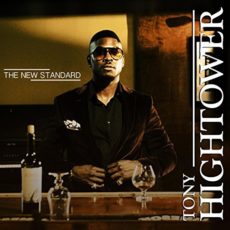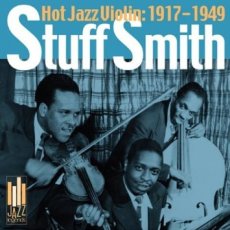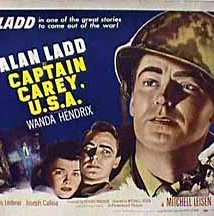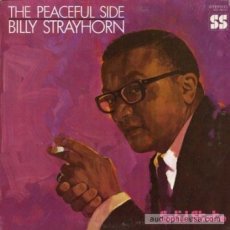
Review: Tony Hightower | The New Standard
To take upon oneself the task of reviewing music, one must begin with simply listening. Not just for the instrument but every component that makes a recording session into something special. Sometimes it warrants a drive down the highway, accompanying a Saturday morning house cleaning or in some instances, a quiet place. Regardless of the locale, you approach each one with enthusiastic anticipation and pray the experience will be a pleasurable one.
In recent years there has been a cadre of singers who scour the Great American Songbook only to choose everyone’ favorite songs to record, leading the listener down a well-worn and tiresome road. However, there are an extraordinary few who hear something different and blaze new trails with the standards. I seek out those who choose to dip their proverbial ladles into the uncharted waters and successfully contribute impressive versions of great compositions and originals to the pantheon.
So, to step out and name a debut project The New Standard, in such revered footsteps as Herbie Hancock, takes not only faith but also a confidence in one’s ability to create something beyond ordinary. Unequivocally, this is what composer, arranger and vocalist Tony Hightower has accomplished with his penning of six original tunes, while taking out a loan from Burt Bacharach and Hal David, Eden Ahbez, and Thelonious Monk, thus making this an offering worthy of the title.
Throughout my Atlanta residency as a deejay I was privileged and honored to witness the maturation of the musicians and vocalists who keep the city alive with jazz. From this pool of talent Tony selected pianist Kenny Banks Jr., drummer Henry Conerway III and bassist Kevin Smith to be his principle rhythm section, interchanging pianists Phil Davis on “Minor Major”, Nick Rosen on “Close To You” and Mose Davis and Marcus Williams on “I Mean You”. It is evident he possessed clarity to hear the touch that is required to give each song new life.
Foresight is a gift that is given few and Mr. Hightower has blessed the world with an album of such magnitude. Enlisting Atlanta jazz royalty that defines the new face of the modern jazz generation, he brings the maturity of Kebbi Williams, Melvin Jones, Mike Burton, Dorran Thigpen, Frank Houston and Wilbert Williams to bear witness. If this is not enough to satiate your musical palate, he washes the orchestrations with the voices of Theresa Hightower, Natasha Brown, All Us Katz, Keasha Copeland, Sandra Miller, Donna Ector, Kelsie Broughton and Felicia Hardy.
As I listened to this project for the fourth, fifth and sixth time I never tired of hearing the “A” game this talented young man brought into the studio. Relentlessly he engulfs your senses with an accompaniment of strings by David Davidson, David Angell, Elizabeth Lamb and John Catchings. Wrap all this music up in a well-designed liner and you are told an equally compelling story through words and pictures, allowing you to take a peak into the mind of the man behind the music. I surmise, you will agree that this is a testament to his musical acumen and prowess.
The evidence lies before you. You only have to listen to the conversation to understand the brilliance of what you hear. Over a year ago, this young man said he was going to give me something I would enjoy. If this is what lies behind the marquee for the new standard, it was delivered as promised.
carl anthony | notorious jazz | november 30, 2014
Give A Gift Of Jazz ~ Share
![]()
#preserving genius
More Posts: bandleader,history,instrumental,jazz,music,review,vocal

The Jazz Voyager
The Brisbane Jazz Club: 1 Annie Street, Kangaroo Point, Brisbane, Australia / Telephone: 61-7-33912006 / The venue is situated on Brisbane river and is open for live jazz every Thursday, Friday, Saturday and Sunday evenings. Each month we also feature a Sunday riverside brunch show and also regular jam sessions. We present two major weekend festivals each year – our Brisbane Big Band Festival in May, and our Oz Manouche Festival in November with International Gypsy jazz artistes.
Next Stop: Jakarta, Indonesia – Taking off out of Brisbane at 9:45am, I kick back for the six hour 20 minute flight to Denpasar, Indonesia. there I have a two hour before getting on the connecting flight to Jakarta at 4:10pm, crossing another time zone and arriving what seems like an hour at 5:10 in Jakarta. I have a few days to enjoy the city before heading out to hear some great jazz.
Sponsored By

Daily Dose Of Jazz…
Benny Moten was born on November 30, 1916. A solid and supportive bassist, he had a long career as a sideman for decades. He began seriously playing professionally in 1941 and quickly developed relationships with top players of the time.
Over the course of his career Benny played and recorded with such artists as Hot Lips Page, Henry “Red” Allen, Stuff Smith, Arnett Cobb, Ella Fitzgerald, Wilbur DeParis, Roy Eldridge and Dakota Staton, just to name a few. He toured Africa from 1956 – 1957.
Bassist Benny Moten, often confused or mistaken for pianist and bandleader Bennie Moten, was never a leader however he remained musically active as a sideman until the time of his death at the age of 60 on March 27, 1977.
More Posts: bass

Hollywood On 52nd Street
Mona Lisa, written for the 1950 film Captain Carey, U.S.A. by Ray Evans and Jay Livingston. The title and lyrics refer to the renaissance portrait of the same name painted by Leonardo da Vinci. The song won an Oscar for Best Original Song in 1950. The movie is a drama starring Alan Ladd, Wanda Hendrix and Francis Lederer.
The Story: A group of agents of the U.S. Office of Strategic Services is sent to German-occupied Italy during World War II to knock out the German-held Italian railroad system. In accomplishing this mission, most of them are killed because of an inside betrayal. After the war, one of the survivors, Captain Webster Carey (Alan Ladd), resolves to find the traitor. Captain Carey returns to Orta, near Milan, to find out who betrayed his World War II O.S.S. team and caused the deaths of several villagers. Much to his surprise, his old love Giulia whom he thought dead at the hands of the Nazis, is alive and married to a powerful Italian nobleman, Barone Rocco de Graffi.The villagers are unfriendly, but Carey persists in his clandestine efforts to flush out the traitor.
Sponsored By
www.whatissuitetabu.com

Daily Dose Of Jazz…
Billy Strayhorn was born William Thomas Strayhorn on November 29, 1915 in Dayton, Ohio but the family moved to Pittsburgh, Pennsylvania shortly after his birth. Protecting him from his father’s drunken sprees his mother sent him to live with his grandparents in North Carolina, which is here he first became interested in music. He learned to play hymns on the piano and listening to records on her Victrola.
By high school he was back in Pittsburgh and began his music career studying classical music, writing a school musical, forming a trio that played daily on the radio and composing Life Is Lonely (renamed Lush Life), My little Brown Book and Something To Live For while still in his teens.
When the harsh reality of a black man making it in the white classical world shattered his 19-year-old ambitions, Strayhorn turned to the music of Art Tatum and Teddy Wilson and was guided into jazz. In 1938 he met Ellington, impressed him with an arrangement of a Duke piece, went to New York and collaborated with Ellington for the next quarter century. He composed Take The “A” Train, Chelsea Bridge, Day Dream, Such Sweet Thunder and A Drum I A Woman among others and the landmark score to the film Anatomy Of A Murder.
Billy was openly gay, participated in many civil rights causes, was a committed friend to Dr. Martin Luther King, influenced and help propel the singing career of Lena Horne, embarked on a solo career and continued to compose and arrange for Ellington.
Billy Strayhorn, composer, pianist and arranger whose compositions are known for the bittersweet sentiment and classically infused designs that set him apart from Duke succumbed to esophageal cancer on May 31, 1967. His final song “Blood Count”, composed while in the hospital, was the first track on Ellington’s memorial album for Strayhorn, …And His Mother Called Him Bill. The final track is a solo version of Lotus Blossom performed by Duke for his friend while the band was packing up.




